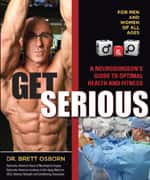Life Extension Magazine®

DO, FAANS, CSCS
Brett A. Osborn, DO, FAANS, CSCS, is a neurological surgeon with a secondary certification in anti-aging and regenerative medicine—and a Life Extension® member. He specializes in scientifically based nutrition and exercise and is a walking billboard for his recommended regimen. His book, Get Serious, A Neurosurgeon’s Guide to Optimal Health and Fitness, teaches that we need to take responsibility for our own health and longevity. In this exclusive interview, Dr. Osborn talks about some of the key recommendations in his book.
LE: Dr. Osborn, to what extent do our genes predetermine our health and longevity?
BAO: The truth is most ailments of modern-day society are preventable. Yes, most strokes, dementia, heart attack, diabetes, spine disorders, and even most cancers, are preventable… You are ultimately in control. So stop blaming your genes! Keep in mind that the majority of diseases—barring those of a congenital nature—are environmental in origin.
LE: Even cancer?
BAO: Yes, this even includes cancer! It was previously thought that if one developed cancer, he or she “had bad genes.” Cancer was “genetic.” Cancer is largely an environmental disease, period. As many as 90 to 95% of all types of cancers have their roots in the environment and lifestyle. As noted in a study published in Pharmacology Research, a respected, mainstream medical journal, “The evidence indicates that of all cancer-related deaths, almost 25 to 30% are due to tobacco, as many as 30 to 35% are linked to diet, about 15 to 20% are due to infections, and the remaining percentage are due to other factors like radiation, stress, physical activity, environmental pollutants, etc.” You and you alone have a choice, a choice to be healthy or sick. And this choice is independent of the hand your parents dealt you.
LE: Angelina Jolie recently had a prophylactic double mastectomy based upon the results of genetic testing.
BAO: Well, here’s the deal. There are specific genes, which if mutated, are associated with the development of certain cancers— BRCA1 and BRCA2 in the context of breast cancer. If high-risk individuals harboring these mutations were identified, they potentially could intervene early, thereby preventing disease. Keep in mind, however, that the incidence of the BRCA mutation in the general population is low. According to the American Heart Association, heart disease claims nearly 500,000 women yearly. This is nearly 12 times more than reported breast-cancer related deaths in 2009. Accordingly, educating the public about this preventable disease should be more the focus of our attention than radical celebrity-endorsed procedures that will benefit relatively few, specifically those with the gene.

LE: In your book, you suggest we should lump cancer and other lethal diseases together and search for a common cause, correct?
BAO: The answer is a resounding YES! In recent years, inflammation has come to the forefront as a major player in the genesis of atherosclerotic heart disease, cerebrovascular disease, diabetes, and cancer. From my standpoint, all diseases have an inflammatory component, all of them. And this is where we should focus our efforts primarily, from a preventive standpoint. Hunting down genetic mutations in existing tumors is too late. Instead, we should be preventing the genetic mutations and protecting the genome by limiting free-radical production and reducing oxidative stress. This will ultimately reduce the incidence of all diseases, not just cancer, as most have similar origins.
LE: But inflammation is protective of the body.
BAO: Restated, acute inflammation is protective of the body. It is integral to our immune response, wound healing and repair of exercise-induced muscle damage… Chronic inflammation on the other hand serves absolutely no benefit. Unfortunately, in many of us, this flame burns unchecked and disease accumulates. Blame no one except yourself and certainly not your genes. You are “insulting” your genes by presenting them with bad stimuli such as poor nutrition, tobacco smoke, and a lack of exercise. Chronic exposure to excess free radicals (oxidation) and inflammation cause age-related disease. Oxidation and inflammation are like two peas in a pod. Where there is one, there’s the other.
LE: How can we determine our inflammation levels?
BAO: Have your CRP checked. CRP, or C-reactive protein, is a protein secreted by the liver in response to a variety of stimuli, namely those that activate the inflammatory cascade. Interestingly, one of the factors that causes an elevation in CRP levels is secreted by adipocytes or fat cells. It should not come as a surprise, therefore, to learn that patients with metabolic syndrome have elevated CRP levels. In fact, CRP is an independent risk factor for coronary heart disease, hypertension, type II diabetes, and atherogenic dyslipidemia. Do not procrastinate and allow bodily inflammation to run rampant one day longer. Stop inflamm-aging in its tracks with proper nutrition, exercise, supplements, and, if need be, pharmaceuticals. Drive your [high-sensitivity CRP test results] down [toward] zero. This is an indication that you are doing something right.
LE: Your book stresses that both saturated and unsaturated fats are essential to health. But aren’t saturated fats bad for us?
BAO: [They’re] not as bad as was once thought. Ironically, their cautious consumption may confer protection against a variety of diseases. On the other hand, unsaturated fats are not all “good.” Omega-3 fatty acids isolated from cold water fish, yes; omega-6 fatty acids in the context of the American diet, no. Allow me to explain. Saturated fat in the presence of high glycemic index carbohydrates—or reduced levels of “good” polyunsaturated fats—elevates LDL or “bad” cholesterol levels. On its own, it doesn’t.

LE: So it’s beneficial to consume saturated fat?
BAO: Right, but only under favorable conditions. Low insulin levels are mandatory, as is high dietary omega-3 fatty acid intake. Unfortunately, the typical American diet fosters high insulin levels, lacks adequate omega-3 fatty acids, and is replete with omega-6 fatty acids, which in excess are inflammatory in nature. This milieu is atherogenic, or artery clogging. To prevent heart disease, the number one killer of Americans, and to potentially reduce the incidence of certain cancers among many other diseases, one must alter the omega-6:omega-3 ratio. I’m not a fish eater, yet I take high-dose omega-3 capsules. For me, it’s not an apple a day, but an oil change a day that keeps the doctor away.
LE: So what is cholesterol and how risky are high levels of it?

BAO: Cholesterol is vital to our existence, as are fats. This waxy substance is the precursor of many hormones including cortisol, testosterone, progesterone, and estrogen. In fact, it is considered the “mother of all hormones.” Cholesterol is also a crucial component of cell membranes, including the myelin sheaths of neurons. Unfortunately, due to the aggressive scare tactic-based marketing schemes utilized by Big Pharma, most individuals with “high cholesterol” are prescribed statins as a preventive modality for coronary heart disease. Well guess what? The data don’t pan out. A 2010 meta-analysis of more than 65,000 patients concluded that the use of statins in a high-risk primary prevention setting was not associated with a statistically significant reduction in the risk of all-cause mortality. Instead, concern yourself with the subtypes of LDL [cholesterol] floating around in your blood and your triglyceride: HDL ratio—each of which can be optimized with dietary interventions and not by default with statins.
LE: Doesn’t consuming less saturated fat lower LDL cholesterol?
BAO: While there may be a reduction in LDL when saturated fat intake is reduced, there is subtype shift from LDL “A” to “B,” hence an increased coronary risk. In addition, one sacrifices the HDL-bolstering effect of saturated fat intake through so-called low-fat diets. Native LDL unto itself is harmless—particularly the pattern A subtype; it is the oxidized LDL particle that causes the problems. Therefore, keeping oxidative stress in check is more important than your “cholesterol number.”
LE: How can we determine our LDL cholesterol subtypes?
Dr. Osborn’s Key Supplement Recommendations
In his book, Get Serious, A Neurosurgeon’s Guide to Optimal Health and Fitness, Dr. Brett Osborn recommends his program for building a healthy, fit, and strong body and mind. Among his recommendations are key supplements. We asked him for his favorites and to explain the rationale for each choice.
Omega-3 fatty acids: If you could choose one, this would be it! There are literally volumes of data demonstrating the beneficial effects of omega-3s’ stemming from their robust anti-inflammatory capacity.
Resveratrol: In addition to providing robust anti-inflammatory effects, resveratrol influences the expression of several gene products that influence metabolism.
Green tea extract: Green tea has anticancer effects, probably through its epigallocatechin gallate, or EGCG content.
Vitamin D: You may not realize it, but vitamin D3 is actually a hormone, a vital bodily hormone acting directly on the genome.
Curcumin: Curcumin has powerful anti-inflammatory properties which thwarts the formation of amyloid plaque.
B-Complex: B-complex vitamins are important for what is termed “methylation,” a cellular process that occurs a billion times per second. Deficient or “hypo” methylation is associated with a variety of diseases such as cancer, coronary artery and cerebrovascular disease, and neural tube defects.
Vitamin C: This is integral to numerous biological processes such as tissue repair, the quenching of free radicals, and the formation, along with the maintenance, of skin, tendons, ligaments, and blood vessels.
Vitamin E (mixed tocopherols and tocotrienols): The benefits of vitamin E are numerous. For example, supplementation has been demonstrated to reduce atherosclerotic plaque burden and improve one’s lipid profile.
Magnesium: Okay, there is no arguing about this one: Magnesium stabilizes the heart muscle and prevents arrhythmias. It lowers blood pressure by relaxing blood vessels, plays a role in carbohydrate metabolism, and reduces one’s risk of osteoporosis by augmenting bone density.
Probiotics: This is the good bacteria that most of us lack in our gut. Just because the bowel in actuality is external to the body does not permit you to neglect it. Nurture it, instead, for optimal health.
And more: Choose a multivitamin that is just that, “multi,” [as in] multiple capsules or tablets per day. While water is not considered a supplement, it should be. Even mild dehydration can affect mental and physical performance. Gastrointestinal function may also be impaired, resulting in delayed transit times and constipation.
BAO: VAP—Vertical Auto Profile—testing is a cholesterol, lipid, and lipoprotein test. It measures all the components of a standard lipid profile but delves further, segmenting cholesterol into subclasses. Subtype A is “fluffy” and less apt to be integrated into atherosclerotic plaque, while subtype B is dense and atherogenic. A standard lipid profile does not differentiate the two. For this reason, it is completely erroneous to assume that elevations in LDL are wholly bad. Your LDL may be composed mainly of subtype A.
LE: In Get Serious, you explain that many pharmaceuticals have been shown to boost health in ways for which they were not specifically intended—but they are simply not offered to patients. Why not?
BAO: Because they are “off-label,” and doctors are quite frankly, nervous of lawsuits. And that’s a crying shame. Why? Because your doctor may be taking them!
LE: Can you give us an example?
BAO: Statin drugs can lower cholesterol levels, but what you may not know is how many doctors—like me—are taking these drugs, even those who don’t have cholesterol problems. Why? Statins are also potent anti-inflammatory agents.
LE: You wrote that you also take the diabetes drug metformin.
BAO: Remember resveratrol? Well guess what: Metformin acts on similar enzymatic pathways, increasing insulin sensitivity, and by virtue, reducing the insulin signal. Reducing the insulin signal secondarily reduces inflammation in animal models. This likely occurs in humans as well, given the antitumoral effects metformin has on a variety of cancers. This effect, too, is the result of reduced growth factor expression in response to metformin. It acts at the level of the gene! And its actions are not limited to the insulin-signaling pathway; they are wide reaching, affecting and modulating many bodily processes. An analog of metformin will one day be launched as an “anti-aging” drug.
LE: Should everyone consider taking metformin now to inhibit aging—or wait for longevity studies?
BAO: [Metformin] mimics the effect of caloric restriction (CR). This significantly extends life in animal models. By reducing the insulin signal and therefore the risk of cancer, diabetes, vascular disease, and obesity, it will likely have similar effects in humans. Are you going to wait and see if it extends life prior to discussing this option with your doctor? I’ve been on metformin for years. Not a single untoward effect. And no, it typically does not make one hypoglycemic. Should you choose to take metformin, you must supplement with additional B vitamins, particularly B12 and folate.
LE: Your book addresses ways to build a stronger body. Is there a secret to adding muscle?
BAO: The only way to develop strength and build muscle is to progressively overload a muscle group through proper exercise. What is the optimal way to lose body fat and improve your physique? Aerobics? No. Resistance training. Weight lifting.
LE: No elliptical machines or other equipment or special classes?
BAO: The pillars of the training regimen will always be the five basic compound movements: squat, bench press, deadlift, overhead press, and a chin/pull-up or rowing movement. Whatever your goals, if you want to be big and muscular, or if you want to be nicely toned and sculpted, these basic exercises will get the job done. No balls or bikes or bands needed.
LE: In the chapter Supplements 101, you recommend particular nutritional supplements. How do you choose what supplements are most essential?
BAO: I chose my supplements logically, based upon what we know to be the agents of the aging process and particularly, age-related disease. And they are the same: free radical damage, oxidative stress, and chronic inflammation.
LE: Thanks a lot, Dr. Osborn.
BAO: Thank you.

Brett Osborn, MD, is a Board-Certified Neurological Surgeon (ABNS) with a secondary certification in Anti-Aging and Regenerative Medicine. He has also received a CSCS (certified strength and conditioning specialist) honorarium from the National Strength and Conditioning Association. In addition to spending the last 10 post-residency years performing brain and spine surgeries, he has counseled patients on the roles of sound nutrition and exercise in their quest for total body health.
For further information, please visit http://drbrettosborn.com.
To order a copy of Get Serious, A Neurosurgeon’s Guide to Optimal Health and Fitness, call 1-800-544-4440
If you have any questions on the scientific content of this article, please call a Life Extension® Health Advisor at 1-866-864-3027.

